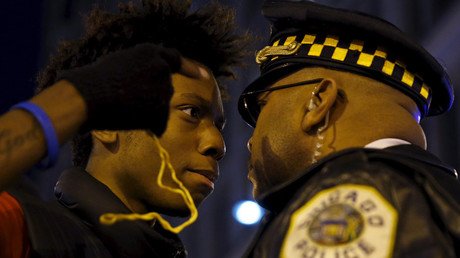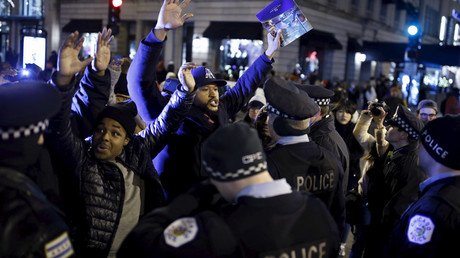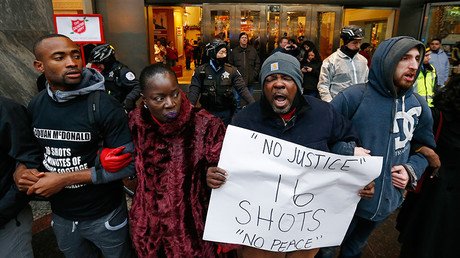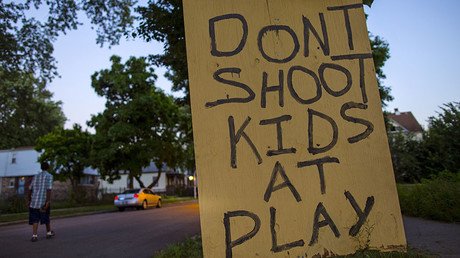Chicago police body cameras fail to record killing of unarmed black teen
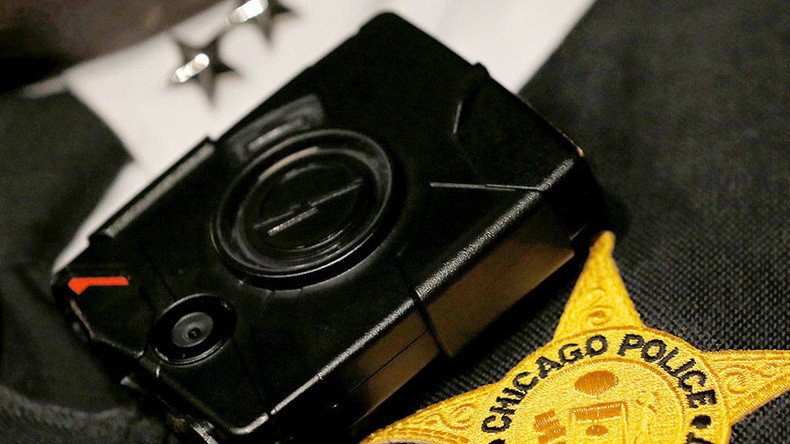
While Chicago Police Department dashboard and body cameras captured enough to suspend three officers involved in the fatal shooting of a black teenager, the camera worn by the officer who killed Paul O'Neal did not record the critical shots, police say.
The Chicago Police Department (CPD) is investigating why police cameras did not record the fatal shooting on July 28 of Paul O'Neal, 18, in the city's South Shore neighborhood. Police said O'Neal, who was unarmed, was spotted by two Chicago police officers driving a reportedly stolen Jaguar. O'Neal led officers on a chase before he crashed into a police squad car and a parked vehicle. The two officers opened fire on the Jaguar — in possible violation of CPD rules. A police dashboard camera captured one of those officers firing, a source told the Chicago Tribune.
O'Neal then reportedly exited the car and attempted to flee. A third officer then opened fire, hitting O'Neal in the back. The young man was later pronounced dead of the gunshot wound. Upon performing an autopsy, the Cook County Medical Examiner's Office ruled O'Neal's death a homicide.
The body camera of the third officer was not activated, so it did not record the fatal shot, police said. After a preliminary review by CPD, officials don't believe the officer purposely turned off the camera, but that the officer's lack of experience or the car crash was responsible for the disabled camera, the Tribune reported.
“There’s a lot of video footage of it, but the actual encounter, that part is not captured on video footage,” Chicago Police Superintendent Eddie Johnson said, according to WBBM. Johnson said a review of the available police footage was enough to suspend three of the four officers involved of their normal police duties, relegating them to paid administrative duty.
CPD Supt. Eddie Johnson sent this email after officers shot, killed 18yo Paul O'Neal last week, 74/Merrill #chicagopic.twitter.com/yFrppjzmhJ
— Peter Nickeas (@PeterNickeas) August 2, 2016
Johnson would not disclose why the officers were found in violation of CPD policy, but the department's use-of-force guidelines prohibit officers from shooting at moving vehicles, but to not "unreasonably endanger" themselves in the process of following the policy. Johnson said all the officers involved have been a part of CPD for three years or less.
“I know how quickly you have to make decisions,” Johnson said. “So if it’s an honest mistake, then we will get them training, coaching, mentoring and get them back out there. If it’s intentional misconduct, they have to be held accountable for it."
CPD said the officers only received the body cameras about 8 to 10 days prior to the incident, WGN reported.
The investigation of the shooting is now the responsibility of the Independent Police Review Authority, which is aiming to complete its probe within about two months, WBBM reported.
Meanwhile, none of the police footage has been released to the public. A policy that began following the highly controversial 2014 police killing of Laquan McDonald — in which CPD withheld for more than 13 months police footage of McDonald's killing amid 16 shots fired — requires police videos of shootings to be released within 60 days.
On Monday, O'Neal's mother, Tanisha Gibson, filed a federal, wrongful death lawsuit against the officers, accusing them of firing on her son "without legal justification," the Tribune reported.
“People can say all they want about ‘he shouldn’t' have been in a stolen car,’ that is for the court system to have decided, that's why we have a justice system,” attorney Michael Oppenheimer said, according to WGN.
Oppenheimer also questioned police claims about body cameras in light of the O'Neal shooting.
"The police department is now saying that these brand new body cameras that are supposed to save the world and give the police and the public transparency, did not work," he said, adding, "When all of a sudden, there is a police shooting where they execute a kid in the back of the head, who is unarmed, how convenient that they don't work?"
Activists demand release of fatal police shooting of Paul O'Neal https://t.co/S2j2woGR5ppic.twitter.com/LhAvLft9GL
— DNAinfo Chicago (@DNAinfoCHI) August 2, 2016
O'Neal's family and community activists are calling for an early release of police footage of the incident.
“If the police were right then they're right and we have to do better as a community with our young people but if they were wrong then we have to hold them accountable,” activist William Calloway said.
O'Neal, a recent high school graduate, was a good kid but lacked a father figure in his life, said family spokesperson Ja'Mal Green. O'Neal's actions do not excuse such police brutality, Green added.
“What would have been right was the chase him and arrest him if they had to taze him then taze him,” said Green.
Earlier this afternoon, #Chicago tallied its 400th homicide. Last year didn’t tally 400 until Sep 29th & it wasn’t until Nov 13th for 2014.
— HeyJackass.com (@w_h_thompson) August 1, 2016
